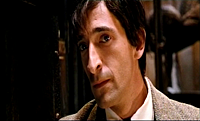The Passion of the Kong
How to Turn a Classic into a Masterpiece
An Appreciation by Barry M. Lamont
Adrien Brody
In 1933, the character Jack Driscoll is the First Mate on the Venture, the ship carrying Denham and his crew to Skull Island. When this "tough guy" discovers that he doesn't mind having a woman on the ship after all, it is just a new variation on a very old story; when Driscoll leads the effort to rescue Ann, it is precisely what you would expect his character - or any First Mate - to do. The film, as Peter Jackson points out, essentially becomes a power struggle between two alpha males - Driscoll and Kong - which does make it somewhat predictable.
In 2005, Jackson creates a new character who simultaneously embodies and mocks the 1933 Driscoll: Bruce Baxter, a swaggering, shallow, vain movie actor who stars in the lurid adventure films of the day but doesn't necessarily want to experience them in real life. (Interestingly, while Baxter's character is not found in the earlier film, there is a parallel in Victor Hugo's book: if the 1933 Driscoll resembles Captain Phoebus, Baxter reminds me a lot of Pierre Gringoire.) Instead, the human hero of Jackson's film becomes - Adrien Brody, no one's obvious choice as an action hero. His Jack Driscoll is a fussy New York playwright, who had no intention of going on a jungle adventure and finds the whole experience unpleasant; this man of letters is not the one we expect to lead the rescue effort when Ann is taken, and it makes the story more interesting. (It also allows Jackson a sly dig at the earlier film: Bruce Baxter says some lines spoken by the 1933 Jack Driscoll; the 2005 Driscoll describes them as "pure effluence".)
This very different starting point - Brody's less aggressive, more complex portrayal, precisely what his casting was meant to accomplish - creates an entirely different character arc, and allows for the kind of personal growth not seen in 1933, when everyone emerged from the story pretty much the way they went into it. It also completely changes the tone of the film.
In 2005, Jackson creates a new character who simultaneously embodies and mocks the 1933 Driscoll: Bruce Baxter, a swaggering, shallow, vain movie actor who stars in the lurid adventure films of the day but doesn't necessarily want to experience them in real life. (Interestingly, while Baxter's character is not found in the earlier film, there is a parallel in Victor Hugo's book: if the 1933 Driscoll resembles Captain Phoebus, Baxter reminds me a lot of Pierre Gringoire.) Instead, the human hero of Jackson's film becomes - Adrien Brody, no one's obvious choice as an action hero. His Jack Driscoll is a fussy New York playwright, who had no intention of going on a jungle adventure and finds the whole experience unpleasant; this man of letters is not the one we expect to lead the rescue effort when Ann is taken, and it makes the story more interesting. (It also allows Jackson a sly dig at the earlier film: Bruce Baxter says some lines spoken by the 1933 Jack Driscoll; the 2005 Driscoll describes them as "pure effluence".)
This very different starting point - Brody's less aggressive, more complex portrayal, precisely what his casting was meant to accomplish - creates an entirely different character arc, and allows for the kind of personal growth not seen in 1933, when everyone emerged from the story pretty much the way they went into it. It also completely changes the tone of the film.
